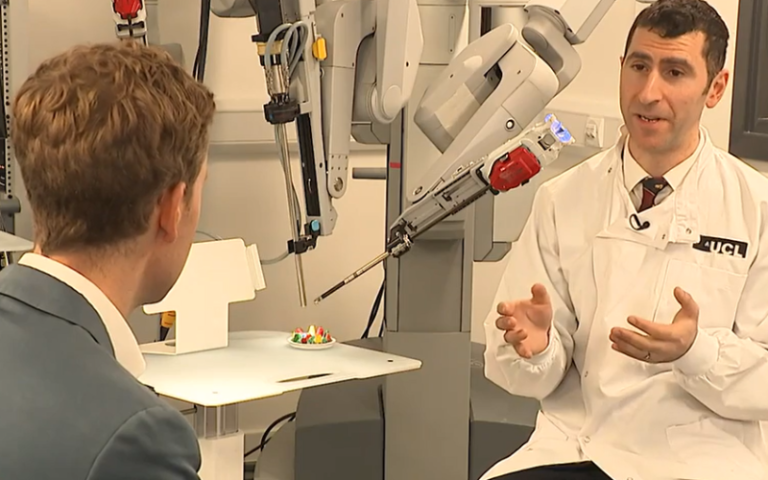New framework outlines how to develop, evaluate and monitor surgical robots
13 February 2024
Experts from across the world, led by UCL Queen Square Institute of Neurology scientists, have created a framework to evaluate the use of robots for surgical procedures.

In 1999, Intuitive emerged as a pioneer in the field of robot-assisted surgery with the launch of their da Vinci system. The system works by allowing surgeons to perform surgery with instruments guided by a console in real time. The small instruments have a greater range of motion than the human hand and highly magnify the area – making the surgery much less invasive than traditional techniques.
It is mostly used for complex surgeries, such as bladder, prostate and kidney cancer.
However, since in recent years many of the patents tied to some of the da Vinci’s most basic features have expired, and there has been a rush to develop new systems with even more advanced functions.
As a result, an international group have come together to create a framework to guide the introduction of robots and ensure we are prepared for their use in surgery.
The consensus statement, published in Nature Medicine, considers the perspective of clinicians, patients, hospitals and developers to agree safe criteria for increasingly autonomous robots as their use in medical settings increases.
First author, Hani Marcus (UCL Queen Square Institute of Neurology), said: “This framework goes beyond providing just a clinical perspective on the use of robots and AI in surgery.
“The statement was written with patients, and they are very much at the heart of it. We also include recommendations on the need to evaluate ergonomics so that clinicians find the robots usable, and wider economic analyses to ensure that hospitals find the robots cost-effective, alongside promoting global health and sustainability.
“It’s a broad remit, but having so many different perspectives has given us clear guidance for bringing these technologies into the operating theatre.”
The framework provides recommendations for evaluation across the entire lifespan of robots, including: Pre-clinical and early clinical evaluation, Comparative evaluation, and Long-term monitoring and technological evolution.
Recommendations for early clinical evaluation included: the need to document any changes to the robot, its software, or its use; developing the working relationships between robots and surgeons; creating a transparent patient consent process; and assessing the potential costs and environmental impact.
At the comparative evaluation stage, recommendations were centred around: refining techniques and establishing clear policies to govern their clinical use; and comparing robot-assisted surgery with the current gold-standard treatment to start building up the evidence base.
And the focus of final stage recommendations were: developing standardised training for clinicians; and monitoring patient outcomes over time to ensure the use of robots in surgery continues to be supported by solid data.
Mr Marcus said: “All of a sudden, there’s not just one robot but many robots in widespread use, so it’s a good time to have a framework to evaluate them.
“We hope this framework will provide a safety net, particularly with the emergence of AI and increasingly autonomous robots.”
The framework was created by the IDEAL Robotics Colloquium, which involves 81 researchers, from 12 countries across the world, and is managed by the University of Oxford.
The first author is funded by the Wellcome / EPSRC Centre for Interventional and Surgical Sciences (WEISS) and the UCLH/UCL Biomedical Research Centre.
Links
- Marcus, H.J., Ramirez, P.T., Khan, D.Z. et al. The IDEAL framework for surgical robotics: development, comparative evaluation and long-term monitoring. Nat Med 30, 61–75 (2024). https://doi.org/10.1038/s41591-023-02732-7
- Hani Marcus's academic profile
- UCL WEISS
Image
- Credit: ITV News
 Close
Close

